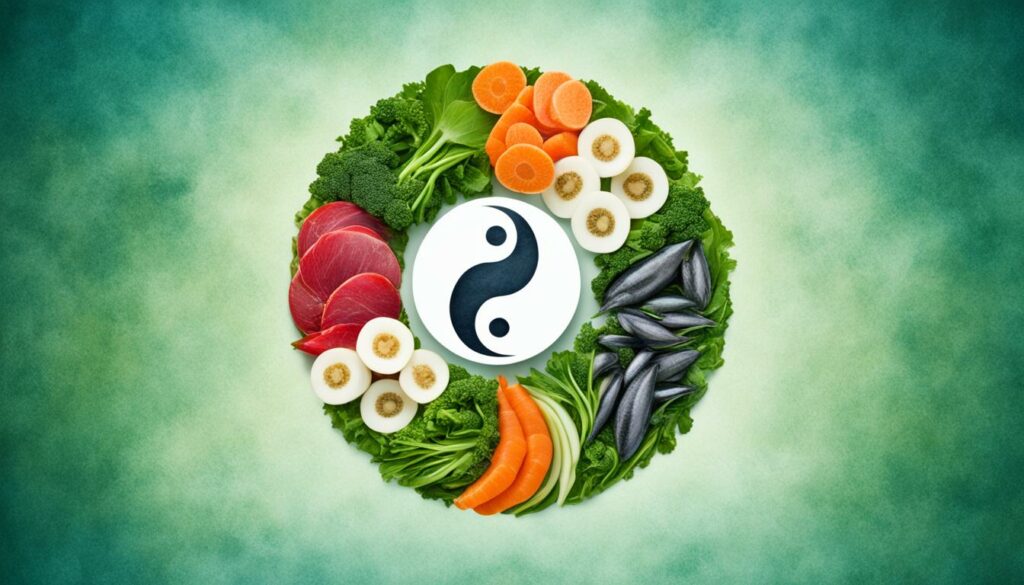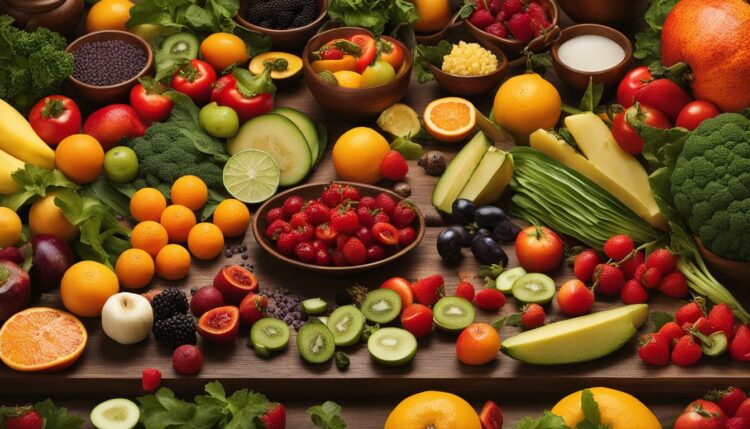Did you know that the Taoist diet is not just about what you eat, but also about how it can contribute to a long and healthy life? This ancient Chinese dietary practice has been passed down through generations and is believed to promote longevity and overall well-being.
By understanding the principles of the Taoist diet and incorporating them into your lifestyle, you can unlock the secrets to a healthier and more balanced life.
Key Takeaways:
- The Taoist diet is a holistic approach to nutrition that aims to promote longevity and overall well-being.
- It emphasizes the balance of yin and yang energies in the body through the consumption of specific foods.
- Principles of the Taoist diet include eating foods that are in season, avoiding excessive consumption of raw and cold foods, and incorporating herbs and spices with medicinal properties.
- Specific foods in the Taoist diet, such as sweet potatoes, ginseng, and cinnamon, offer numerous health benefits.
- The principles of Feng Shui and the connection between emotions and nutrition also play a significant role in the Taoist diet.
The Importance of Yin and Yang in the Taoist Diet
In the Taoist diet, the concept of yin and yang plays a central role. Yin represents feminine energy, darkness, and coldness, while yang represents masculine energy, light, and heat.
The aim is to maintain a balance between these opposing forces in the body through the consumption of appropriate foods. This balance is believed to promote optimal health and prevent disease.
According to the Taoist food philosophy, yin and yang energies must be in harmony to achieve overall well-being. The Taoist diet emphasizes the importance of balancing these energies through the selection of specific foods.
For instance, during hot weather, cooling foods are recommended to counterbalance the heat, while in cold weather, warming foods should be consumed to provide warmth and balance.
To illustrate the significance of yin and yang in the Taoist diet, here is a simplified representation:
| Yin | Yang | |
|---|---|---|
| Nature | Moon | Sun |
| Temperature | Cold | Hot |
| Taste | Sweet | Salty |
| Color | Black | White |
The balance between yin and yang is crucial because an excess of either can lead to disharmony in the body. For instance, an excess of yin can cause coldness and stagnation, while an excess of yang can result in inflammation and hyperactivity.
The Taoist diet emphasizes the consumption of foods that balance these energies, supporting overall health and well-being. By understanding and incorporating the principles of yin and yang, individuals can make informed dietary choices that promote a harmonious and balanced lifestyle.

Key Principles of the Taoist Diet
The Taoist diet is guided by several key principles that center around promoting a balanced and holistic approach to nutrition. By following these principles, individuals can nourish their bodies and maintain overall well-being.
- Eat a Balanced Diet: The Taoist diet emphasizes the importance of consuming a variety of whole foods. This includes incorporating grains, legumes, vegetables, fruits, and lean proteins into meals. By creating a balanced plate, individuals can ensure they receive a wide range of essential nutrients to support their health and vitality.
- Practice Mindful Eating: Mindful eating is a core principle of the Taoist diet. It encourages individuals to listen to their body’s cues for hunger and fullness. By practicing mindful eating, people can savor each bite, focus on the present moment, and develop a deeper connection with their food.
- Embrace Medicinal Herbs and Spices: The Taoist diet recognizes the healing properties of medicinal herbs and spices. Ingredients like ginseng and ginger are commonly used to enhance health and well-being. These natural remedies can provide numerous benefits, such as boosting the immune system and reducing inflammation.
- Moderation is Key: The Taoist diet promotes moderation and avoiding extremes in food choices. By practicing moderation, individuals can maintain a balanced approach to nutrition and prevent the negative consequences of excessive consumption.
By incorporating these key principles into their dietary habits, individuals can embrace the wisdom of the Taoist diet and experience the benefits of a holistic and balanced approach to nutrition.
Specific Foods and Their Benefits in the Taoist Diet
The Taoist diet incorporates a variety of specific foods that are known for their health-promoting properties and potential to enhance longevity. These foods play a key role in nourishing the body and supporting overall well-being. Here are some of the notable foods in the Taoist diet and their associated benefits:
Sweet Potatoes and Yams
Sweet potatoes and yams are considered staples in the Taoist diet due to their rich nutritional profile. They are abundant in beta-carotene, vitamin C, and fiber, which are essential for strengthening anti-aging defenses, promoting healthy skin, and supporting optimal digestion.
Ginseng
Ginseng is highly revered in Chinese medicine and the Taoist diet for its remarkable health-enhancing properties. It is known to enhance immune function, regulate hormones, improve memory and cognitive functions, and increase overall vitality.
Cinnamon, Ginger, and Mint
Cinnamon, ginger, and mint are widely used herbs and spices in the Taoist diet due to their numerous health benefits. Cinnamon is known for its anti-inflammatory and antioxidant properties, ginger aids digestion and reduces inflammation, while mint supports digestive health and provides relief from various gastrointestinal issues.
Seaweeds
Seaweeds, such as kelp and nori, are highly valued in the Taoist diet for their dense nutritional content. They are excellent sources of essential minerals and antioxidants, which support kidney function, promote healthy skin, and enhance overall vitality.
Oily Fish
Oily fish, like salmon and sardines, are considered important additions to the Taoist diet due to their high omega-3 fatty acid content. These fatty acids are essential for brain health, reducing inflammation, and supporting cardiovascular health.
Tonics
The Taoist diet incorporates various tonics to nourish and strengthen the body. Some common tonics include goji berries, cordyceps, reishi mushrooms, and ginseng. These tonics are known for their adaptogenic properties and are believed to enhance overall well-being, boost energy levels, and support the body’s natural healing abilities.
By including these specific foods in the Taoist diet, individuals can harness their unique health benefits and support their journey towards longevity and holistic well-being.
| Food | Benefits |
|---|---|
| Sweet Potatoes and Yams | Rich in beta-carotene, vitamin C, and fiber; strengthens anti-aging defenses, promotes healthy skin, and supports digestion. |
| Ginseng | Enhances immune function, regulates hormones, improves memory and cognitive functions, and increases vitality. |
| Cinnamon, Ginger, and Mint | Cinnamon: Anti-inflammatory and antioxidant properties; Ginger: Aids digestion and reduces inflammation; Mint: Supports digestive health and provides relief from gastrointestinal issues. |
| Seaweeds | Rich in essential minerals and antioxidants; supports kidney function, promotes healthy skin, and enhances vitality. |
| Oily Fish | High in omega-3 fatty acids; supports brain health, reduces inflammation, and promotes cardiovascular health. |
| Tonics (Goji berries, Cordyceps, Reishi, Ginseng) | Nourishes and strengthens the body; enhances overall well-being, boosts energy levels, and supports natural healing abilities. |
The Role of Feng Shui in the Taoist Diet
The practice of feng shui, based on the Taoist concept of energetic polarity, is an integral part of the Taoist diet. Feng shui aims to create a harmonious and balanced living environment by arranging furniture and objects in alignment with the principles of yin and yang energy.
The north and west directions are associated with yin, representing femininity, darkness, and coldness, while the south and east directions are associated with yang, representing masculinity, light, and heat.
By incorporating feng shui into our living spaces, we can optimize the flow of energy and promote overall well-being. Just as the Taoist diet focuses on balancing the yin and yang energies within our bodies through food, feng shui focuses on balancing these energies in our living spaces.
The principles of feng shui go beyond mere aesthetics and placement of furniture. It involves careful considerations of colors, shapes, materials, and elements to create a harmonious environment that supports the balance of yin and yang energies.
By creating a balanced and positive living environment, feng shui aims to enhance our health, happiness, and prosperity.
Here are some key aspects of feng shui and its role in the Taoist diet:
The Yin and Yang Directions
In feng shui, the north and west directions are considered yin, while the south and east directions are considered yang. These directions play a vital role in the placement of rooms and furniture within a space.
Color and Element Associations
Feng shui assigns specific colors and elements to each direction, based on their yin or yang nature. For example, the use of cool colors and water elements is often recommended for yin directions, while warm colors and fire elements are associated with yang directions.
Enhancing the Flow of Energy
Through careful arrangement of furniture, decluttering, and incorporating natural elements, feng shui aims to enhance the flow of energy or “qi” within a space. This promotes a positive and balanced atmosphere that aligns with the principles of the Taoist diet.
By integrating feng shui principles into our living spaces, we can create environments that support the balance of yin and yang energies, complementing the holistic approach of the Taoist diet.
This harmonious synergy between our physical surroundings and our dietary practices can contribute to overall well-being and a deeper connection with nature and ourselves.

The Connection Between Emotions and Nutrition in the Taoist Diet
In the Taoist diet, there is a deep understanding of the relationship between emotions and nutrition. According to Chinese nutrition, each organ in the body is associated with a specific emotion. By nurturing these organs with the right foods and herbs, one can achieve emotional balance and support overall well-being.
For instance, the lungs are closely connected to the emotion of grief. When experiencing grief or loss, the Taoist diet suggests consuming foods that nourish and tonify the lungs. These may include foods such as pears, white mushrooms, and almonds, which are believed to have a soothing effect on the lungs.
The liver, on the other hand, is associated with anger. When feeling anger or frustration, the Taoist diet recommends incorporating foods that promote liver health. These may include bitter greens like dandelion leaves, artichokes, and lemons, which are believed to support detoxification and balance liver function.
The digestive system is often linked to worry or overthinking. When faced with excessive worry or stress, the Taoist diet suggests consuming foods that calm and support digestion. Examples include chamomile tea, ginger, and fermented foods like sauerkraut or kimchi, which can aid in promoting a healthy gut.
By understanding these emotional associations with organs and incorporating the appropriate foods and herbs, individuals can support their emotional well-being while also nourishing their bodies.
“The Taoist diet recognizes the profound connection between emotions and nutrition, offering a unique approach to supporting emotional and physical health.”
Through the Taoist diet, individuals can cultivate a deeper awareness of the mind-body connection and make conscious choices that promote emotional balance and digestive health. By nourishing both the body and the spirit, the Taoist diet offers a holistic approach to well-being.
| Organ | Associated Emotion | Recommended Foods |
|---|---|---|
| Lungs | Grief | Pears, white mushrooms, almonds |
| Liver | Anger | Dandelion leaves, artichokes, lemons |
| Digestive System | Worry | Chamomile tea, ginger, fermented foods |
Conclusion
The Taoist diet offers a holistic approach to nutrition, focusing on achieving balance and promoting longevity and overall well-being. By incorporating the principles of yin and yang, individuals can nourish their bodies in a way that supports optimal health.
This ancient Chinese dietary practice emphasizes consuming a balanced diet, seasonally appropriate foods, and incorporating medicinal herbs and spices.
The Taoist diet’s emphasis on natural, whole foods provides essential nutrients and promotes the body’s self-healing capabilities. By embracing the wisdom of the Taoist diet, individuals can tap into the secrets of longevity and cultivate a healthier, more harmonious lifestyle. This holistic approach to nutrition acknowledges the interconnection between physical health, emotional well-being, and spiritual balance.
By adopting the Taoist diet, individuals can experience numerous benefits, including improved digestion, enhanced immune function, increased energy levels, and better overall health. This dietary practice supports longevity and well-being by nourishing the body, mind, and spirit.
The combination of balanced nutrition, mind-body harmony, and the use of therapeutic herbs and spices makes the Taoist diet a unique and powerful way to optimize health and promote overall wellness.
FAQ
What is the Taoist diet?
The Taoist diet is a holistic approach to nutrition that aims to promote longevity and overall well-being by emphasizing the balance of yin and yang energies in the body through the consumption of specific foods.
What are the principles of the Taoist diet?
The principles of the Taoist diet include eating foods that are in season, avoiding excessive consumption of raw and cold foods, incorporating herbs and spices with medicinal properties, and promoting moderation and balance in food choices.
How does the Taoist diet incorporate the concept of yin and yang?
The Taoist diet aims to maintain a balance between yin and yang energies in the body through the consumption of appropriate foods. For example, cooling foods are recommended during hot weather to counterbalance the heat, while warming foods are consumed in cold weather to provide warmth and balance.
What specific foods are recommended in the Taoist diet?
The Taoist diet includes foods such as sweet potatoes, yams, ginseng, cinnamon, ginger, mint, seaweeds, oily fish, and tonics like goji berries, cordyceps, reishi, and ginseng, which are believed to promote health and longevity.
How does feng shui play a role in the Taoist diet?
Feng shui, based on the Taoist concept of energetic polarity, is integrated into the Taoist diet to create a harmonious and balanced living environment by arranging furniture and objects in alignment with yin and yang energy.
Is there a connection between emotions and nutrition in the Taoist diet?
Yes, in the Taoist diet, each organ is associated with a specific emotion, and imbalances in these emotions can affect digestion and overall health. Specific foods and herbs are recommended to help balance and support the associated organs.
What are the benefits of the Taoist diet?
The Taoist diet offers a holistic approach to nutrition that promotes balance, longevity, and overall well-being. It incorporates whole foods, medicinal herbs and spices, and the principles of yin and yang to nourish the body and support optimal health.




